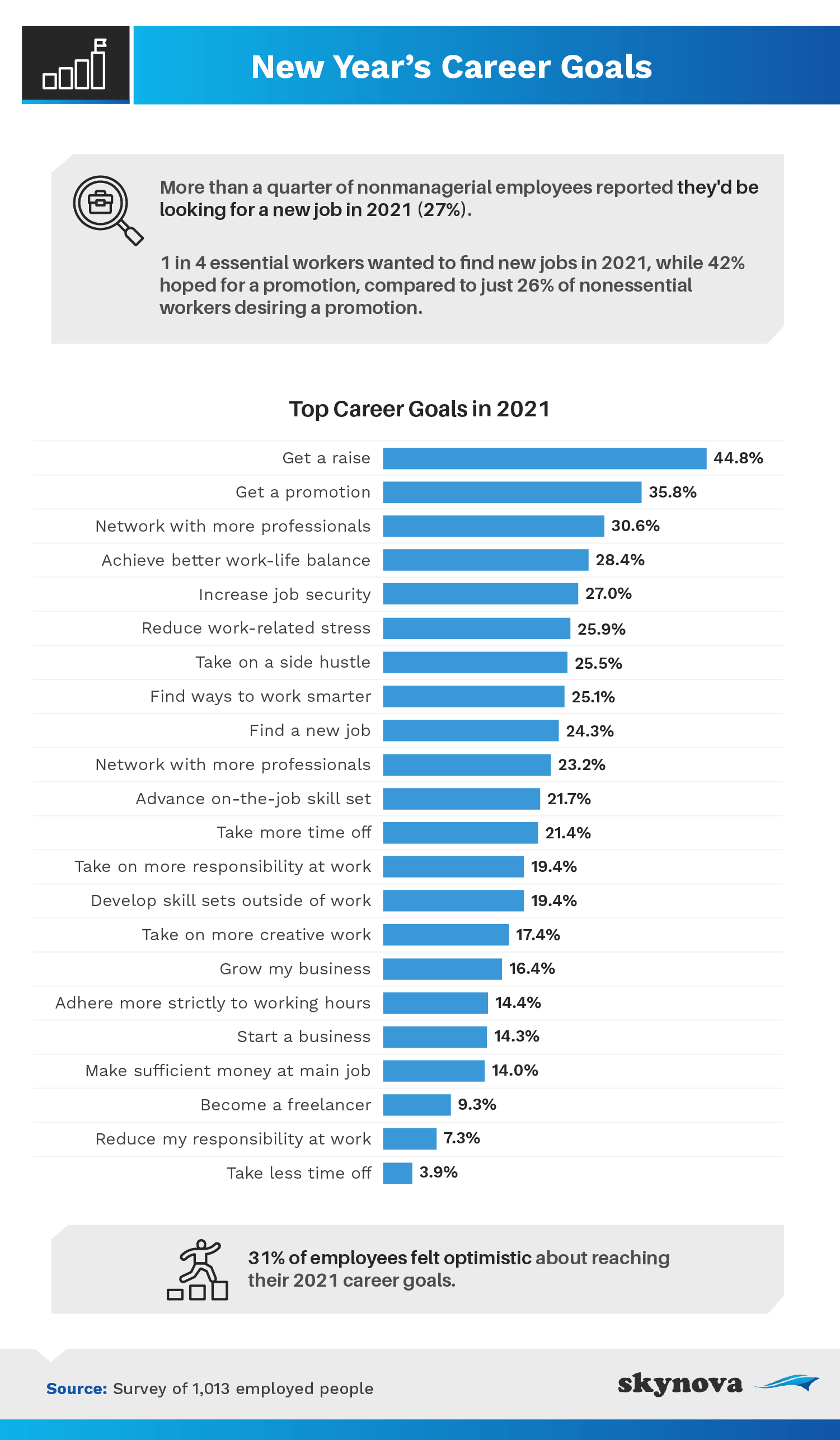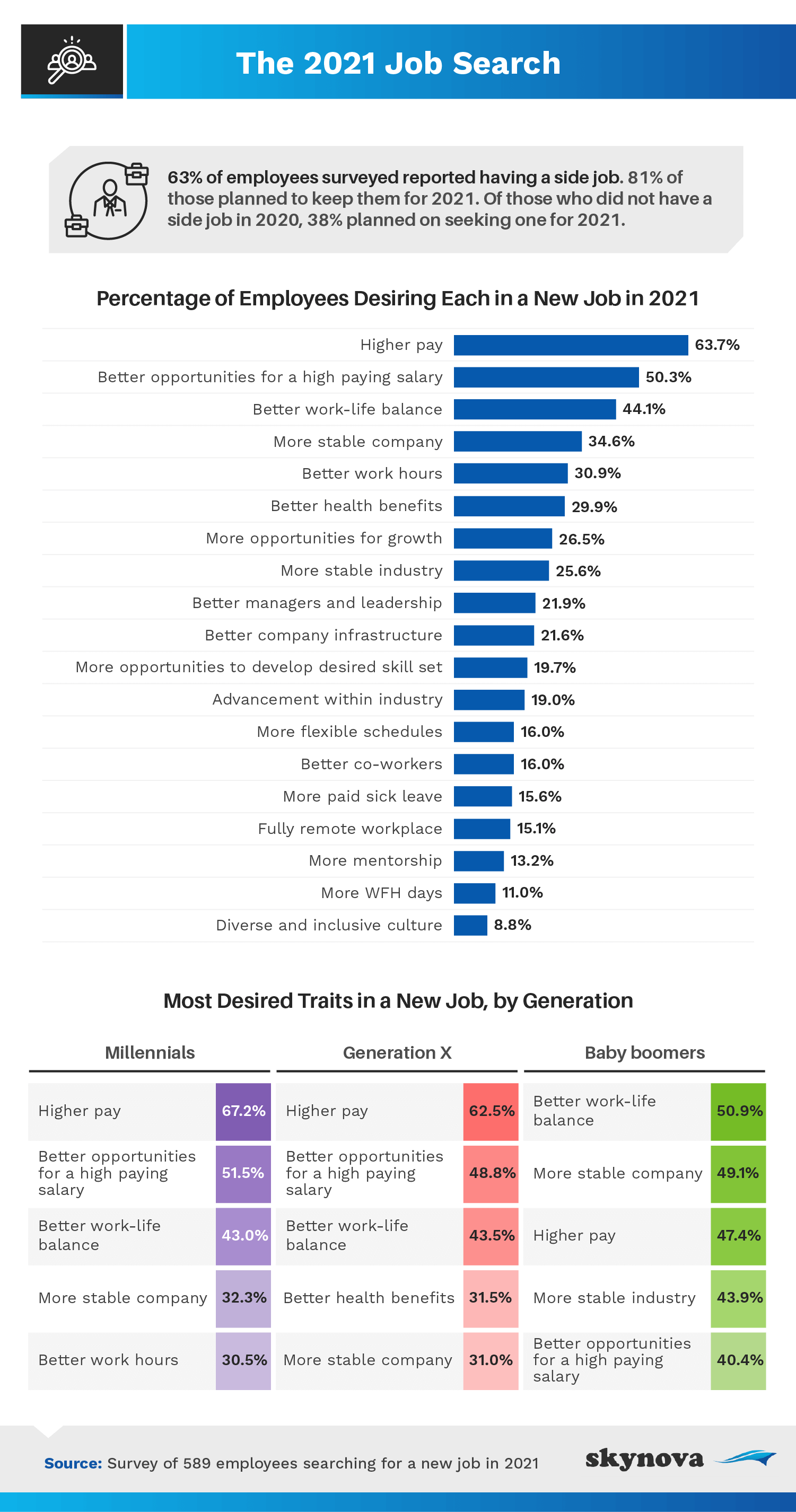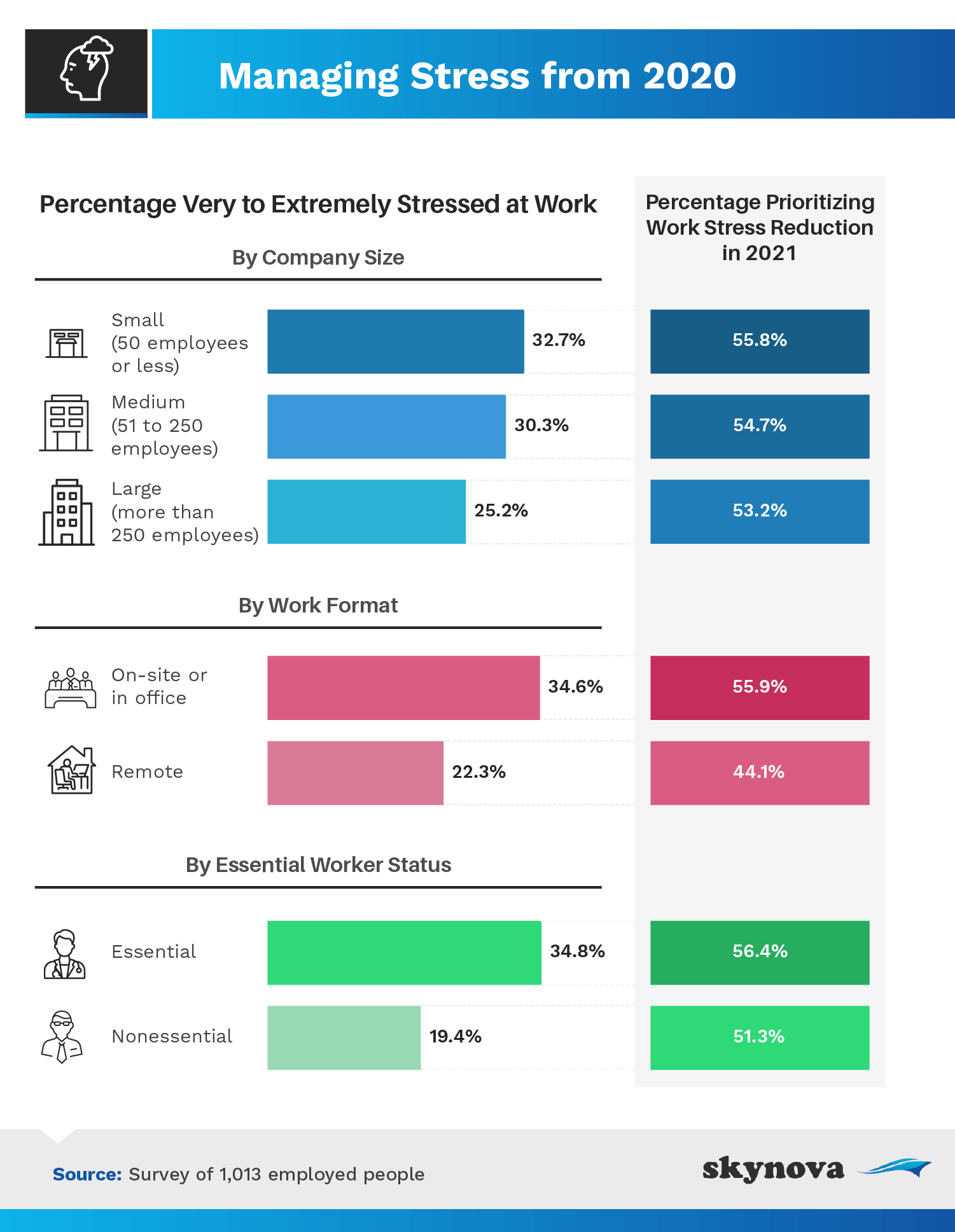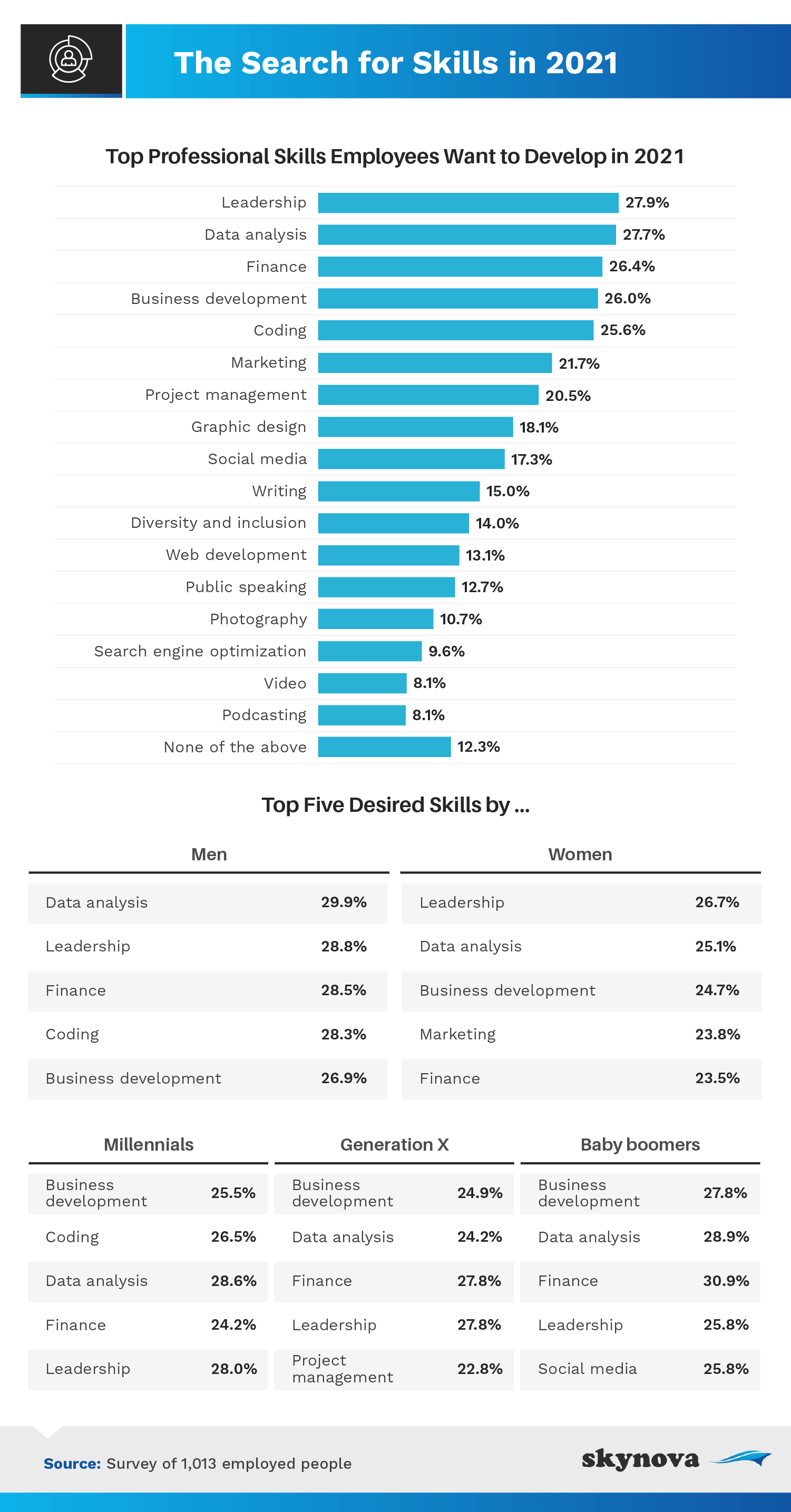
|
Getting in shape, quitting a bad habit, or learning a new skill: Typical years come with typical New Year’s resolutions. And if there is one thing everyone can agree on this year, it’s that 2020 was no ordinary year. Months of isolation left millions picking up new hobbies; heightened awareness of hygiene and health made people reevaluate priorities; and a tanking economy caused skyrocketing unemployment rates.
As 2020 – coined "The Worst Year Ever" – comes to a close, there is plenty for people to look forward to. From serious milestones, like a COVID-19 vaccine, to the simple joys of gathering for the holidays again, 2021 is anticipated to be the year of redemption. So how do people’s New Year’s resolutions reflect such a monumental turn? We surveyed over 1,000 employed people to see what career resolutions they are bringing into the new year. Keep reading for some 2021 goal inspiration.
The pandemic has brought the ugly to light, exposing cracks in workplace safety and leaving many employees to question their loyalty. Despite remaining employed through an attack on the workforce, nearly a third of nonmanagerial employees reported that they would be looking for a new job in 2021. And for those who had taken a harder hit this year, 1 in 4 essential workers want to find new jobs in the upcoming year, with 42% of essential workers desiring a promotion.

As for the workforce in general, the top career goal in 2021 was getting a raise. While nearly 45% of employees wanted to see more money coming in, just under 36% wanted to see a higher ranking title next to their name. Networking with more professionals (30.6%), achieving a better work-life balance (28.4%), and increasing job security (27%) were also among the top career New Year’s goals. However, regardless of the goal itself, 2020 hadn’t dampened all employees’ spirits: 31% of employees said they feel optimistic about reaching their career goals in 2021.
By Gender:
By Generation:
By Job Level:
Of those looking for a new job in 2021, what work-related aspect has become the most important? A whopping 63.7% agreed higher pay is necessary, while just over half were looking for better opportunities for a high paying salary. Better work-life balance was also a top priority, but more so for baby boomers than other generations. Compared to 51% of baby boomers, only 43.5% of Gen Xers and 43% of millennials had plans to look for a job with a better work-life balance in 2021.

Across all generations, however, picking up a side gig was common over the course of the pandemic. Sixty-three percent of employees surveyed reported having a side job, and 81% planned to keep them for 2021. Fortunately for them, side gigs may be the answer to job and financial stability – a necessity made even more apparent by COVID-19. But others are jumping on the side gig train, too. Of those who did not have a side job in 2020, almost 40% planned on seeking one in 2021.
As if 2020 didn’t come with enough stress, workforce cutbacks and job security worries can add a lot of weight to employees’ shoulders. On average, 29% of employees said they were very to extremely stressed at work, but those working at small companies, on-site or in office, and in essential industries felt more stress than the rest. Compared to just a quarter of employees at large companies, 32.7% of small business employees reported feeling very to extremely stressed at work. Even more drastic, remote employees and nonessential workers were 43.2% and 56.8% less likely to report high stress levels compared to their in-office and essential counterparts, respectively.

Naturally, high levels of work stress translated seamlessly into goals for 2021: Employees experiencing the highest levels of stress were also the most likely to prioritize work stress reduction in 2021. Among employees who were "very to extremely stressed," here were some notable goals for 2021:
While their means of decreasing work stress included taking more time off and finding ways to work smarter instead of longer, the majority of very to extremely stressed employees wanted to find a new job in the new year rather than find workarounds to their work stress.
With eyes set on a new job and extra time due to shutdowns, employees have a unique opportunity to develop new skills. In the coming year, developing leadership and data analysis skills were the most popular goals. Finance, business development, and coding skills closely followed, while podcasting, video, and search engine optimization (SEO) skills each garnered under 10% of employees’ attention.

Looking at gender and generational breakdowns, there were few differences. Data analysis topped the charts for men, while leadership was the top desired skill for women. Only one spot on the top five desired skills differed between men and women: While 28.3% of men wanted to develop coding skills, 23.8% of women were more focused on developing marketing skills. Along the same lines, millennials were the only generation in which coding skills made the top five, whereas the desire for project management skills was unique to Gen Xers and social media skills unique to baby boomers.
2020 has put everything into perspective: Health, close contact, and employment should never be taken for granted. But the shaken-up workforce has also opened employees’ eyes to what they really want. Moving into 2021, higher-paying jobs, higher-ranking titles, and greater emphasis on work-life balance are top priorities for most employees. And while we may not have as much time on our hands in the next year, fulfilling the desire to develop skills, like leadership and data analytics, can set a firm foundation for employees to follow through with their goal of finding a new job. Either way, employees seem to be optimistic about 2021. The disaster known as 2020 won’t hold them back.
Skynova offers customers a one-stop shop for all things business. Through simplified online access, customers can create and submit invoices, keep track of accounting, and formulate accurate time sheets. At Skynova, our goal is straightforward: We help small businesses get paid faster. To further enhance customer experience, we also write interesting and informative articles about business and workplace topics with intersections of technology, politics, sports, health, and more. All of the data from articles we publish are gathered from surveys backed by statistics and research conducted by us. That way, we guarantee readers have access to novel insights and perspectives.
Our study explored the experiences of 1,013 employed workers in America and their professional resolutions for 2021. Our margin of error (MOE) for this study was +/- 3%, given the population of employed Americans in 2020 was 158M, according to Statista. MOE for statistics regarding baby boomers was +/- 10%, given the sample size of baby boomers in our survey.
Our survey respondents ranged in age from 18 to 70 with an average age of 38 years old and had to be currently employed in order to qualify for our survey. 27% of respondents worked at a small company or were self-employed, 32% worked at a medium sized company, and 41% worked at a large company. 56% of our respondents said they held an essential worker role, while 44% reported as nonessential. 53% of respondents worked on-site or in-office, while 47% worked remotely. About 44% of our respondents were women, 56% were men, and two respondents identified as nonbinary. Roughly 61% of our respondents were millennials, 28% were Generation X, 10% were baby boomers, and just 2% were Generation Z, and excluded from generational analysis due to insufficient sample size.
Certain limitations apply to self-reported data from surveys, including but not limited to telescoping, exaggeration, and selective memory. We did not weight our data or statistically test our hypotheses. This was an exploration of employee goals for their careers in 2021.
Most people are looking forward to kissing 2020 goodbye and making 2021 their year. Feel free to pass on some career goal inspiration by sharing this project with your readers or friends. All we ask is that you share for noncommercial purposes and include a link back to this page. This ensures our contributors receive proper credit for their work.